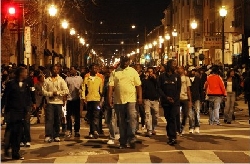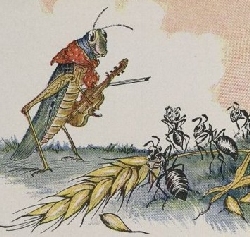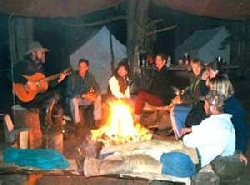 With the advent of social networking software, young people discovered they could stage group events, mostly for fun or some just plain silly, such as a dance or singing ensemble suddenly bursting into a well choreographed number at a public venue, such as a train station or shopping center. The trick was to get the crowd to quickly assemble, perform its "shtick" and then disappear by mingling back into the crowd. Although the original intent was to have fun, a dark side to flash mobs has emerged.
With the advent of social networking software, young people discovered they could stage group events, mostly for fun or some just plain silly, such as a dance or singing ensemble suddenly bursting into a well choreographed number at a public venue, such as a train station or shopping center. The trick was to get the crowd to quickly assemble, perform its "shtick" and then disappear by mingling back into the crowd. Although the original intent was to have fun, a dark side to flash mobs has emerged.
From the recent overthrow of governments in the Middle East to the recent wildings in Philadelphia, Maryland, and San Francisco, Americans are becoming aware of the power and danger of social networking. In the Middle East, Facebook and Twitter were generally regarded as the communication media of choice to orchestrate massive demonstrations protesting government policies. The application in this country though is different and much more criminal in intent. For example, in Philadelphia and Maryland social networking was recently used to queue crowds to enter and loot stores. The effect was chillingly effective, and would send shivers down the spine of any security officer. In San Francisco, it was used to stage an unlawful demonstration aimed at shutting down the BART rail system, thereby disrupting traffic during rush hour. Such incidents are becoming more commonplace and represent a genuine threat to our well being.
There is little doubt criminal flash mobs will affect our way of life. The best way to thwart such incidents is to block telephone and Internet service which can be done relatively easily. Not only will this disrupt the flash mob though, but other legitimate uses of communication devices as well, perhaps even life sustaining services, such as 911. This is the price we will inevitably have to pay for social media running amok. The use of telephone/Internet blockers will likely face a legal challenge from freedom of speech advocates, but this will probably fail as such freedom doesn't apply in life-threatening situations, such as yelling "Fire!" in a crowded theater.
Flash mobs will also be detrimental to downtown areas as stores will be closed early to avoid such wildings. Curfews will likely be imposed to maintain law and order, but such security measures will only hurt downtown merchants, hence another reason to abandon urban areas. In all likelihood we will also witness the end of 24/7 service such as provided by late night convenience stores and gas stations. Those stores with the fortitude to remain open will have to be refitted with new security measures, such as instant lock downs trapping the flash mob until authorities can arrive, and communication blockers. The police will also have to become more adept at social media technology so they can identify and apprehend flash mob ringleaders.
Now don't get me wrong, I like social media and have used it for years. However, I realize there are others who have ulterior motives who wish to use it for criminal or political purposes. For those of you old enough to remember, can you imagine what impact this technology would have had at the 1968 Democratic Convention in Chicago? As wild and as bloody Chicago was, it would have likely been made much worse by this technology. Some people find flash mobs rather humorous and regard it as nothing more than a passing fad. Make no mistake, there is nothing remotely amusing about criminal flash mobs as they are a genuine threat to our way of life. Ask any merchant or security guard who had the displeasure of facing one. Even sadder, such flash mobs ultimately represents a decline in our culture.
Keep the Faith!
Note: All trademarks both marked and unmarked belong to their respective companies.
 Tim Bryce is a writer and the Managing Director of M. Bryce & Associates (MBA) of Palm Harbor, Florida and has over 30 years of experience in the management consulting field. He can be reached at timb001@phmainstreet.com
Tim Bryce is a writer and the Managing Director of M. Bryce & Associates (MBA) of Palm Harbor, Florida and has over 30 years of experience in the management consulting field. He can be reached at timb001@phmainstreet.com
For Tim's columns, see:
http://www.phmainstreet.com/timbryce.htm
Like the article? TELL A FRIEND.
Tune into Tim's THE BRYCE IS RIGHT! podcast Mondays-Fridays, 7:30am (Eastern).
Copyright © 2011 by Tim Bryce. All rights reserved.
 I think we're all familiar with the Aesop fable regarding "The Ant and the Grasshopper." I first heard it in kindergarten when the teacher tried to impress upon us the need for diligent work. As you will recall, the fable describes a grasshopper who spent the warm summer months singing and playing while the ant toiled in the fields in preparation for the cold winter. When it finally arrives, the grasshopper finds itself dying of hunger and begs the ant for food who is less than sympathetic as he remembered how the grasshopper wasted his time earlier.
I think we're all familiar with the Aesop fable regarding "The Ant and the Grasshopper." I first heard it in kindergarten when the teacher tried to impress upon us the need for diligent work. As you will recall, the fable describes a grasshopper who spent the warm summer months singing and playing while the ant toiled in the fields in preparation for the cold winter. When it finally arrives, the grasshopper finds itself dying of hunger and begs the ant for food who is less than sympathetic as he remembered how the grasshopper wasted his time earlier. Have you been paying attention to the talent of our youth lately? Normally we hear nothing but the problems of youth, such as bad manners and attitudes, foul mouths, sex and drugs, cheating, stealing and deceit, car wrecks, and a general disregard of any form of authority; true rebels without a cause. This is why it was so refreshing to recently see some talented young people burst onto the entertainment scene, such as
Have you been paying attention to the talent of our youth lately? Normally we hear nothing but the problems of youth, such as bad manners and attitudes, foul mouths, sex and drugs, cheating, stealing and deceit, car wrecks, and a general disregard of any form of authority; true rebels without a cause. This is why it was so refreshing to recently see some talented young people burst onto the entertainment scene, such as  The country's latest round of economic gymnastics has brought up an old concept that strikes fear in both politicians and the public: Depression. The Great Depression of the 20th century was triggered by the market crash of 1929 which led to a period of approximately ten years of high unemployment, poverty, low profits, deflation, and lost opportunities for economic growth. Basically, we lost confidence in ourselves and our economic future. FDR's social programs of the "New Deal" did not pull us out of it, only war did, specifically WW2.
The country's latest round of economic gymnastics has brought up an old concept that strikes fear in both politicians and the public: Depression. The Great Depression of the 20th century was triggered by the market crash of 1929 which led to a period of approximately ten years of high unemployment, poverty, low profits, deflation, and lost opportunities for economic growth. Basically, we lost confidence in ourselves and our economic future. FDR's social programs of the "New Deal" did not pull us out of it, only war did, specifically WW2. For years in my youth, I was the "go to" guy for operating the family's technical equipment, be it tape recorders, record players, or even our Super 8 movie projector. As I grew older, I eventually relinquished my title to my son who is adept at setting up our High Def TV, cable box, DVD/VHS player, cell/smart phones, and other such devices. It was only when I realized we were as dependent on my son, as my family was on me years ago, that I began to ask why.
For years in my youth, I was the "go to" guy for operating the family's technical equipment, be it tape recorders, record players, or even our Super 8 movie projector. As I grew older, I eventually relinquished my title to my son who is adept at setting up our High Def TV, cable box, DVD/VHS player, cell/smart phones, and other such devices. It was only when I realized we were as dependent on my son, as my family was on me years ago, that I began to ask why. Years ago, when I was working in the world of computer mainframes, upgrading software was a major event. Rarely were minor releases issued with small corrections. Instead, customers were advised months in advance what the upgrades consisted of and when to expect delivery of the release. This information was used to schedule the upgrades and prepare an in-house training schedule to properly educate users. As a software vendor ourselves, we went to great lengths to communicate our plans with our customers and make sure the software update executed smoothly. This all changed with the advent of the PC and the commercial use of the Internet.
Years ago, when I was working in the world of computer mainframes, upgrading software was a major event. Rarely were minor releases issued with small corrections. Instead, customers were advised months in advance what the upgrades consisted of and when to expect delivery of the release. This information was used to schedule the upgrades and prepare an in-house training schedule to properly educate users. As a software vendor ourselves, we went to great lengths to communicate our plans with our customers and make sure the software update executed smoothly. This all changed with the advent of the PC and the commercial use of the Internet.  Lately I seem to be receiving more than my fair share of e-mails. Among the spam I get daily, I can always count on some flyers on various management related workshops. Lately I have been studying these flyers more closely. It has been my observation the courses being offered seem to lack substance and tend to rely on facade. They seem to dance around the issues and, instead, offer classes aimed at making students feel good about themselves or how to be more politically correct. Even worse, they tend to offer some crackpot theory of management under the guise of being scientific, thereby trying to make them fashionable.
Lately I seem to be receiving more than my fair share of e-mails. Among the spam I get daily, I can always count on some flyers on various management related workshops. Lately I have been studying these flyers more closely. It has been my observation the courses being offered seem to lack substance and tend to rely on facade. They seem to dance around the issues and, instead, offer classes aimed at making students feel good about themselves or how to be more politically correct. Even worse, they tend to offer some crackpot theory of management under the guise of being scientific, thereby trying to make them fashionable. "Systems do not have a 'life cycle.' They may go on forever if kept viable with change. The only thing that has a 'life cycle' is a project which has a beginning for planning, a middle for execution, and an end for review."
"Systems do not have a 'life cycle.' They may go on forever if kept viable with change. The only thing that has a 'life cycle' is a project which has a beginning for planning, a middle for execution, and an end for review." Recently, I attended a dinner in downtown St. Petersburg. I invited a young man I knew to accompany me to introduce him to some people for networking purposes. At age 25, he had already finished a hitch in the Army and served in both Iraq and Afghanistan and was now starting his professional career. As we drove home, we discussed the after dinner speaker who had made a reference to Jack Benny, the legendary comedian of yesteryear. My young friend innocently asked, "Who is Jack Benny?"
Recently, I attended a dinner in downtown St. Petersburg. I invited a young man I knew to accompany me to introduce him to some people for networking purposes. At age 25, he had already finished a hitch in the Army and served in both Iraq and Afghanistan and was now starting his professional career. As we drove home, we discussed the after dinner speaker who had made a reference to Jack Benny, the legendary comedian of yesteryear. My young friend innocently asked, "Who is Jack Benny?" Whereas conservatives have become more visible in recent times, it's getting harder to find a liberal these days. For years, the left and the right sparred frequently and mercilessly. This was perhaps best illustrated by the legendary debate between William F. Buckley and Gore Vidal during ABC's coverage of the 1968 Democratic convention in Chicago. Buckley, the conservative, and Gore, the liberal, both held their ground even if it potentially meant a round of fisticuffs. If you've never seen it, you should look it up on
Whereas conservatives have become more visible in recent times, it's getting harder to find a liberal these days. For years, the left and the right sparred frequently and mercilessly. This was perhaps best illustrated by the legendary debate between William F. Buckley and Gore Vidal during ABC's coverage of the 1968 Democratic convention in Chicago. Buckley, the conservative, and Gore, the liberal, both held their ground even if it potentially meant a round of fisticuffs. If you've never seen it, you should look it up on